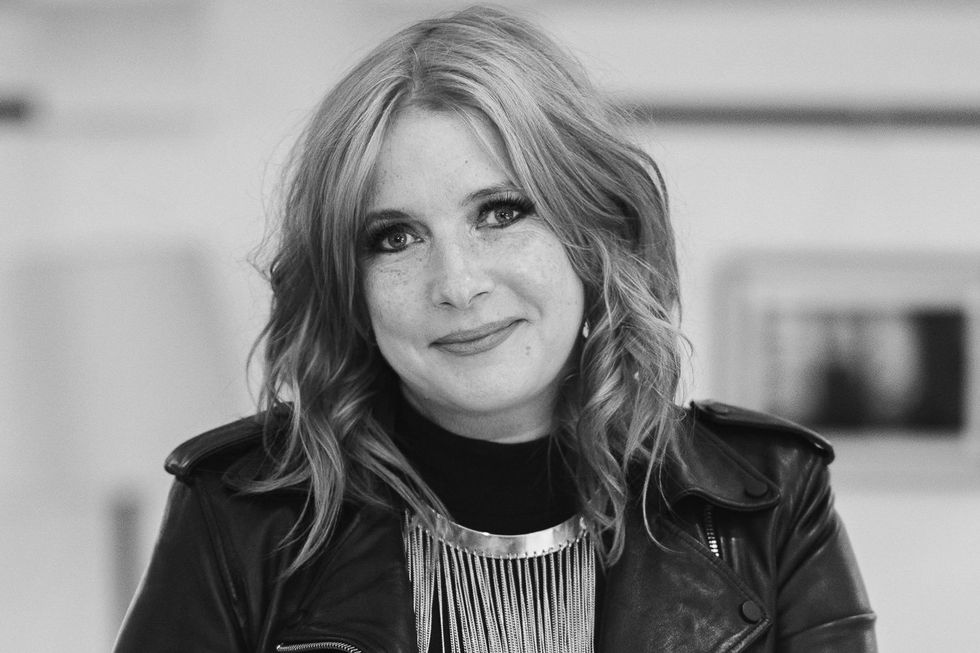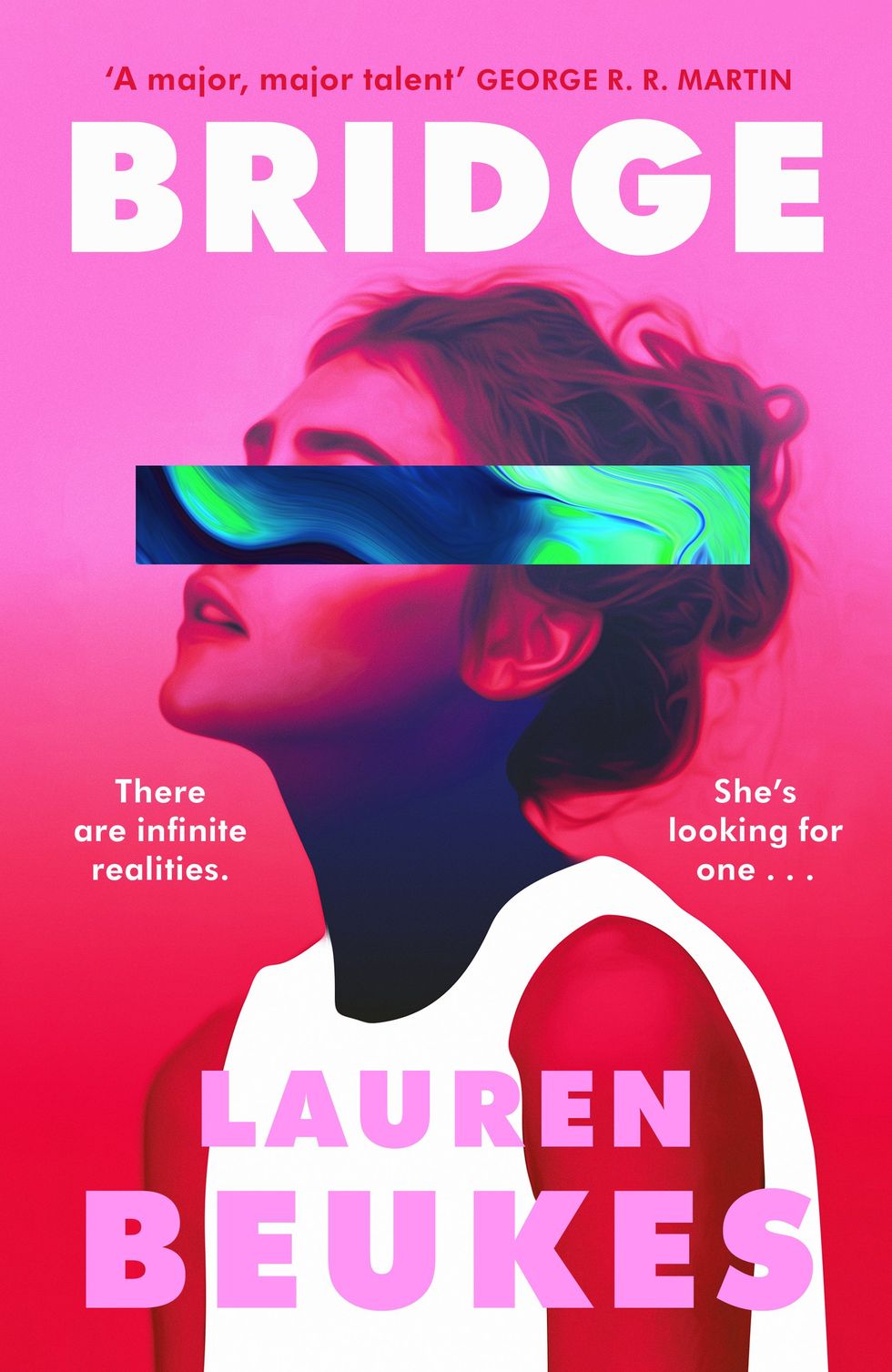From Time-Travel to the Multiverse, Lauren Beukes Returns With 'Bridge'
The award-winning South African author of The Shining Girls sets her new novel in multiple worlds of possibility.

A cropped image of the cover for 'Bridge' by Lauren Beukes.
From the futuristic Cape Town described in her fiction debut, Moxyland, to the sci-fi Johannesburg of Zoo City, where criminals housed animals magically bonded to them, Lauren Beukes has always been interested in alternate realities. The Arthur C Clarke award-winning author explored time travel in The Shining Girls, which followed a serial killer who used a house to help commit his heinous deeds, and the one victim he couldn’t outrun. The book was turned into an Apple TV show starring Elizabeth Moss last year, and took the South African author’s work into a new realm.
In her latest novel, Bridge, Beukes allows readers to explore a different kind of alternate reality, by asking, what if you could visit another version of yourself? Or multiple versions – versions that had gone down splintering paths of life. In Bridge, the titular character discovers an unusual and curious artifact called the dreamworm that allows her to do just that, as she tries to find a message her late mom left for her by embodying different versions of herself, known as her “otherselves.” It’s a thrilling story with colliding worlds, and a troubled but earnest mother-daughter relationship at its center.
Beukes, who is currently based in the U.K., spoke to OkayAfrica about diving into the multiverse and the reality of the current writer’s strike.

Bridge plays with all sorts of concepts like neuroscience and voodoo and music theory. Are these subjects that you've had in your mind for a while that you wanted to explore or was your interest in them more recently sparked?
Lauren Beukes: I collect things; I'm like a magpie, I like all the shiny things. I recently got an ADHD diagnosis in December, and I've realized that's what my brain does, it hordes, like a magpie. And it kind of has a superpower side but then there are also other challenging sides to it. My brain is always working in weird ways. But I'm very interested in a lot of things, and I think the way those things kind of coalesce and come together in my mind, it's very subconscious.
It starts with the question of, wouldn't it be cool if you could swap reality and there was some kind of symbiosis with this strange living artifact – which, of course, will have its own agenda and its own side effects. But then what would the keys and the doors be? And then thinking about music and thinking about visuals.
I knew I wanted it to be the dreamworm, and then I started talking to a friend who was a neuroparasitologist [who studies parasites that can control the nervous system of their host]. So it wasn't that I spoke to the neuroparasitologist first and then had the idea. I already had that strangeness, and then I went and did the research and spoke to neurosurgeons and musicologists and retired police captains. It was an excuse to do fun research.
And a way to keep using your previous skills as a journalist…
Yes, definitely. I think that my huge joy is the research. It's talking to people and figuring out how other minds work and what they're thinking about and hearing other life stories.
This book is not set in South Africa, but you still add in little details like a reference to poet Koleka Putuma, or a fact that South Africans or readers who’ve been with you for a long time will know.
All books are the sum of the author and the author's experience, but yeah, there are little Easter eggs for people who have followed my career or followed my previous books, and also specifically South Africans. I always want to have that in there for South Africans to be like, I know what you're talking about.
Even if your stories aren’t about South Africans or set in the country, do you feel that it’s still important to keep it there in the story in some way?
It's part of who I am, so I don't see how I would ever be able to write divorced from that. I write from a South African perspective; I write from the perspective of having grown up under apartheid, having grown up in a utopia for white people, and the huge social cost that has had, along with colonialism. I'm so informed by a history of trauma that we've been through collectively, and it's really important to me to be able to deal with those social issues, to be able to come from that perspective, to be keenly aware of the world and our place in it, and injustice.

There’s a bit about decolonising African literature in the book – who are some of the other authors you’re excited about at the moment?
There's an amazing new writer called Tanya Junghans, who has a book out that’s really exciting; Wole Talabi is an amazing Nigerian writer – he actually did a top five recently of his favorite urban fantasies set in Africa; Mohale Mashigo can do no wrong, she’s absolutely brilliant, Masande Ntshanga is doing really interesting, challenging work. And Sam Wilson, who’s my age, has a new sci-fi out called The First Murder on Mars, which is not [about] Elon Musk, but it kind of is.
And also, Kizazi Moto, the new Disney project has been really fun and amazing to see, just what's come out of that, including work from Spoek Mathambo. It's really cool. I think there is more of an appetite for it. And I hope that continues to grow, and that we're given more opportunities to tell our stories, but also to own them.
The titular character and her mother get to do what we as readers can’t do in our own lives – visit parallel lives or different versions of ourselves – and come to find it may not be all they hoped it would be?
The thing is, we don't have we don't have a dreamworm. We have our choices. We can't go back in time. We don't have a time-traveling house. We don't have any of these things. So you actually have to make peace with where you are. Of course, there are regrets I have had in my life, like I wish I'd gone to university properly. I didn't but also, I wouldn't be who I am now. Everything builds to who you are, and you learn from the bad things, and hopefully grow to love therapy.
The Shining Girls became a TV series, it seems like Bridge could be a great film…
Tell the studios to pay the writers properly! I also have a TV project which is stalled on the runway at the moment [because of the strike]. It’s an original horror show…I'm really worried for creatives and writers and artists in the future…But let’s bring it back to agency. We have a choice. I’m part of the Writer’s Guild strike, but how do I actually get politicians to engage? How do I vote for people and how do I get them to engage with reality? And I think that's the big question, and one that fiction isn't going to solve. But yeah, how do we become more active citizens and actually try to influence and change where we are right now? So we have a choice, and so our kids have choices? From climate change to AI taking our jobs.

